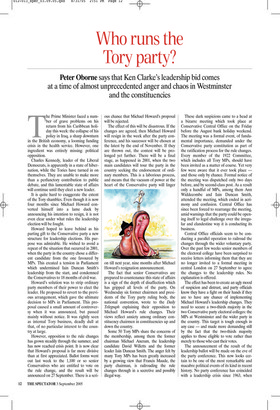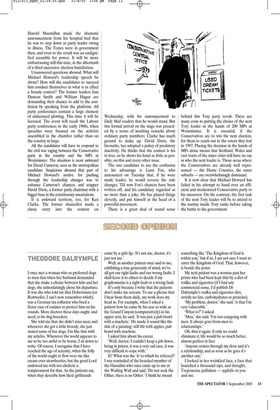Who runs the Tory party?
Peter Oborne says that Ken Clarke’s leadership bid comes at a time of almost unprecedented anger and chaos in Westminster and the constituencies The Prime Minister faced a number of grave problems on his return from his Caribbean holiday this week: the collapse of his policy in Iraq, a sharp downturn in the British economy, a looming funding crisis in the health service. However, one ingredient was entirely missing: political opposition.
Charles Kennedy, leader of the Liberal Democrats, is apparently in a state of hibernation, while the Tories have turned in on themselves. They are unable to make more than a perfunctory contribution to public debate, and this lamentable state of affairs will continue until they elect a new leader.
It is quite hard to exaggerate the extent of the Tory shambles. Even though it is now four months since Michael Howard converted himself into a lame duck by announcing his intention to resign, it is not even clear under what rules the leadership election will be fought.
Howard hoped to leave behind as his parting gift to the Conservative party a new structure for leadership elections. His purpose was admirable. He wished to avoid a repeat of the situation that occurred in 2001, when the party in the country chose a different candidate from the one favoured by MPs. This created a tension in Parliament which undermined Iain Duncan Smith’s leadership from the start, and condemned the Conservatives to 18 months of civil war.
Howard’s solution was to strip ordinary party members of their power to elect the leader. He proposed to revert to the previous arrangement, which gave the ultimate decision to MPs in Parliament. This proposal caused a small amount of controversy when it was announced, but passed mainly without notice. It was rightly seen as internal Tory business, deadly dull at that, of no particular interest to the country at large.
However, opposition to the rule changes has grown steadily through the summer, and has now reached crisis point. It is now clear that Howard’s proposal is far more divisive than at first appreciated. Ballot forms went out last week to the 1,100 or so senior Conservatives who are entitled to vote on the rule change, and the result will be announced on 27 September. There is a seri ous chance that Michael Howard’s proposal will be rejected.
The effect of this will be disastrous. If the changes are agreed, then Michael Howard will resign in the week after the party conference, and his successor will be chosen at the latest by the end of November. If they are thrown out, the contest will be prolonged yet further. There will be a final stage, as happened in 2001, when the two main candidates will tour the party in the country seeking the endorsement of ordinary members. This is a laborious process, and means that the vacuum of power at the heart of the Conservative party will linger on till next year, nine months after Michael Howard’s resignation announcement.
The fact that senior Conservatives are prepared to countenance this state of affairs is a sign of the depth of disaffection which has gripped all levels of the party. On Wednesday six former chairmen and presidents of the Tory party ruling body, the national convention, wrote to the Daily Telegraph explaining their opposition to Michael Howard’s rule changes. Their views reflect anxiety among ordinary constituency chairmen in constituencies up and down the country.
Some 50 Tory MPs share the concerns of the membership, among them the former chairman Michael Ancram, the leadership candidate David Willetts and the former leader Iain Duncan Smith. The anger felt by many Tory MPs has been greatly increased by a growing view that Francis Maude, the party chairman, is railroading the rule changes through in a secretive and possibly illegal way. These dark suspicions came to a head at a bizarre meeting which took place at Conservative Central Office on the Friday before the August bank holiday weekend. The meeting was a formal event, of fundamental importance, demanded under the Conservative party constitution as part of the ratification process for the rule changes. Every member of the 1922 Committee, which includes all Tory MPs, should have been invited as a matter of course. Yet very few were aware that it ever took place and those only by chance. Formal notice of the meeting was dispatched only two days before, and by second-class post. As a result only a handful of MPs, among them Ann Widdecombe and Iain Duncan Smith, attended the meeting, which ended in acrimony and confusion. Central Office has since been forced to rearrange the meeting, amid warnings that the party could be opening itself to legal challenge over the irregular and clandestine way it is conducting its business.
Central Office officials seem to be conducting a parallel operation to railroad the changes through the wider voluntary party. Over the past few weeks senior members of the electoral college have been surprised to receive letters informing them that they are no longer invited to a formal meeting in central London on 27 September to agree the changes to the leadership rules. No explanation is offered.
The effect has been to create an ugly mood of suspicion and distrust, and party officials know they have a fight on their hands if they are to have any chance of implementing Michael Howard’s leadership changes. They need to secure a two-thirds majority in the two Conservative party electoral colleges: the MPs at Westminster and the wider party in the country. This target is tough enough in any case — and made more demanding still by the fact that the two-thirds majority applies to those eligible to vote rather than merely to those who cast their votes.
The announcement of the result of the leadership ballot will be made on the eve of the party conference. This now looks certain to be one of the most remarkable and macabre political events of its kind in recent history. No party conference has coincided with a leadership crisis since 1963, when Harold Macmillan made the dramatic announcement from his hospital bed that he was to step down as party leader owing to illness. The Tories were in government then, and even so the result was an undignified scramble for power. It will be more embarrassing still this time, in the aftermath of a third successive election humiliation.
Unanswered questions abound. What will Michael Howard’s leadership speech be about? How will the candidates to succeed him conduct themselves in what is in effect a beauty contest? The former leaders Iain Duncan Smith and William Hague are demanding their chance to add to the confusion by speaking from the platform. All party conferences contain a large element of unlicensed plotting. This time it will be licensed. The event will recall the Labour party conferences in the early 1980s, when speeches were focused on the activists assembled in the chamber rather than on the country at large.
All the candidates will have to respond to the civil war raging between the Conservative party in the country and the MPs at Westminster. The situation is most awkward for David Cameron, seen as the metropolitan candidate. Suspicions abound that part of Michael Howard’s motive for pushing through the leadership changes was to enhance Cameron’s chances, and scupper David Davis, a former party chairman with a bigger base in the constituency associations.
It is awkward territory, too, for Ken Clarke. The former chancellor made a classy entry into the context on Wednesday, with his announcement to Daily Mail readers that he would stand. But this formal arrival on the stage was preceded by a series of insulting remarks about ordinary party members; Clarke has much ground to make up. David Davis, the favourite, has adopted a policy of predatory inactivity. He thinks that the contest is his to lose, so he shows his hand as little as possible, on this and every other issue.
The one candidate to use the confusion to his advantage is Liam Fox, who announced on Tuesday that, if he were made leader, he would reverse the rule changes. Till now Fox’s chances have been written off, and his candidacy regarded as no more than a joke. He has played things cleverly, and put himself at the head of a powerful movement.
There is a great deal of sound sense behind this Tory party revolt. There are many costs to putting the choice of the next Tory leader in the hands of 200 MPs at Westminster. It is essential, if the Conservatives are to win the next election, for them to reach out to the voters they lost in 1997. Placing the decision in the hands of MPs alone means that Scotland, Wales and vast tracts of the inner cities will have no say in who the next leader is. Those areas where the Conservatives are already well represented — the Home Counties, the outer suburbs — are overwhelmingly dominant.
It is now clear that Michael Howard has failed in his attempt to hand over an efficient and modernised Conservative party to his successor. On the contrary, the first task of the next Tory leader will be to attend to the mutiny inside Tory ranks before taking the battle to the government.










































 Previous page
Previous page